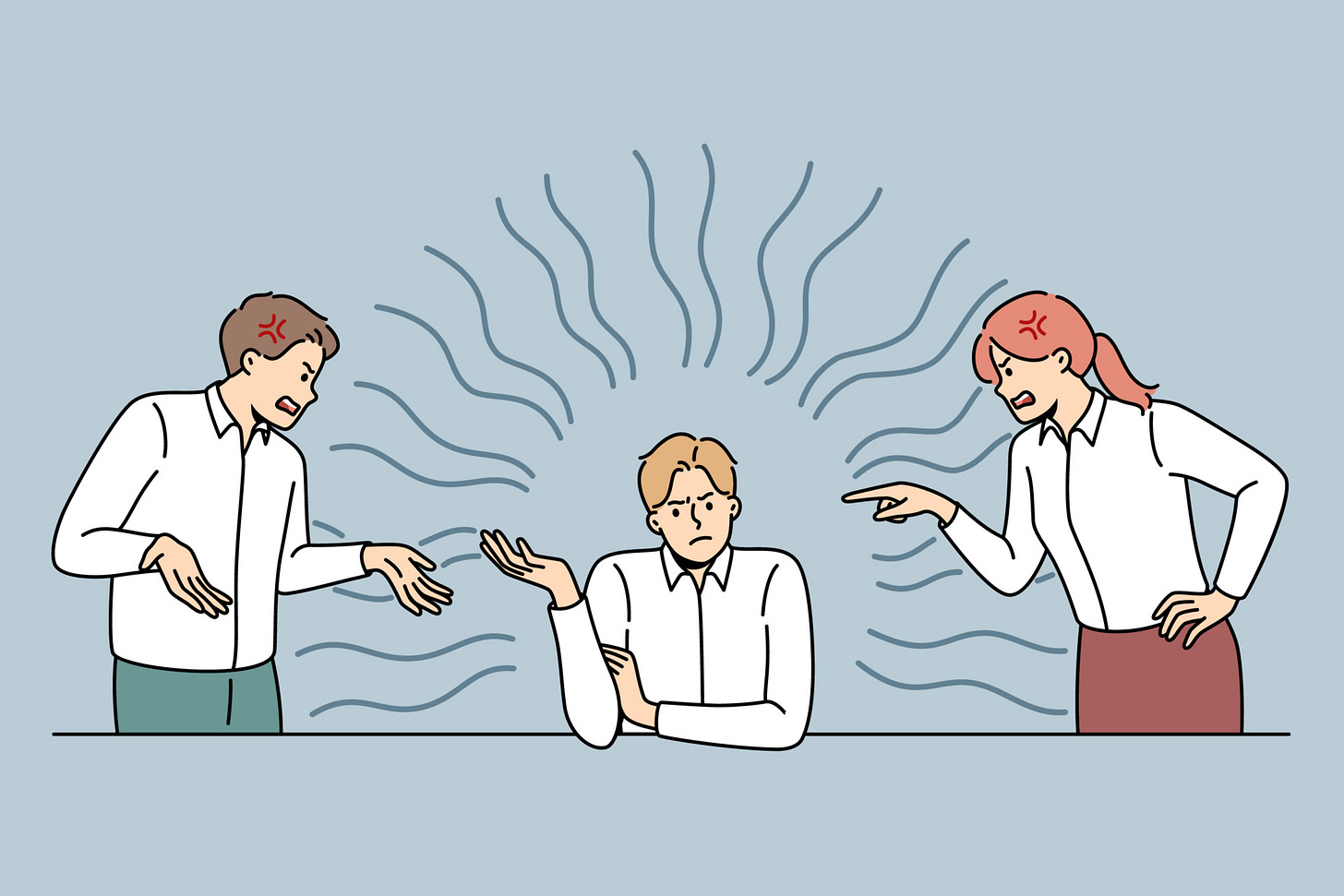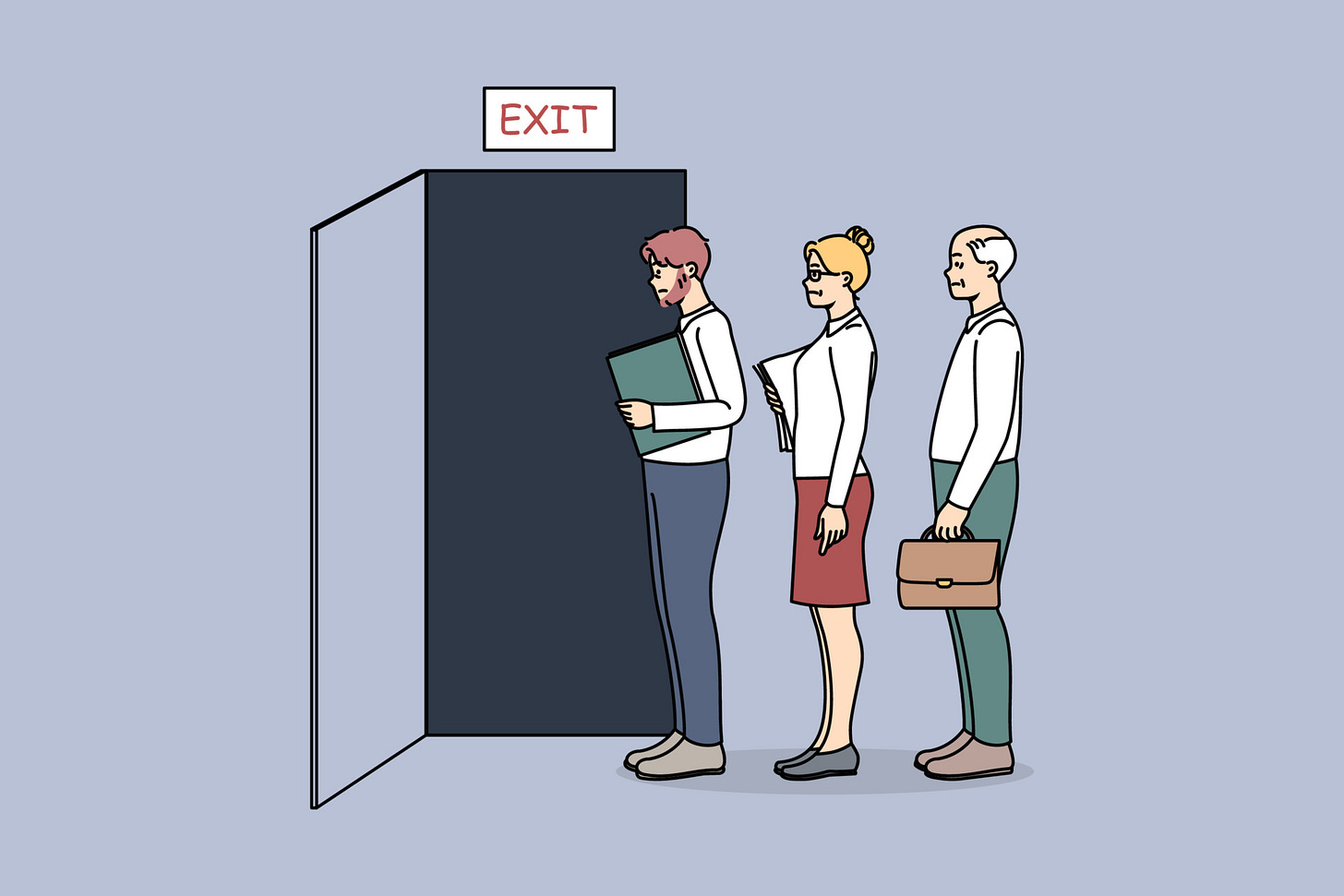NMCJ - 8: The Toxicity Saga (Part 2)
Lessons from spending over a year in a toxic work environment
Happy Friday everyone!
Welcome to my 8th newsletter!
This is the second of a two part piece on my reflections from a year at a toxic workplace. I am picking up from where I left off last week so, if you haven’t already or would like a refresher, check out NMCJ - 7: The Toxicity Saga (Part 1).
As was the case in NMCJ - 7, this is the story of what I experienced at one of my previous employers. I’ll refer to them as ‘TOXICO’ from here on.
Let’s continue….
Notice signs of gaslighting
When there is a communication breakdown from top to bottom and a culture of fear takes hold, people often try to look out for themselves and, in the process, backtrack from any particular stance or statements that they might be holding onto.
I was, for instance, asked by my Line Manager to prepare a Sales KPI (Key Performance Indicators) report with an agreement on certain KPIs that would be covered. Once I completed the report and submitted it, he got back with an angry response notifying me that I had failed to follow his request and that he expected better from me because I had missed out on some parts that we had agreed on. When I tried to confront him on the fact that I had delivered what was asked of me, he denied it outright.
My hunch was that the C-Suite had, in turn, not communicated their expectations to him properly and that had trickled down to me. He was just saving himself by putting me in the firing line.
One isolated incident like that could be put down to a misunderstanding but such incidents became a regular occurrence. I eventually reached a point where I started doubting myself and I felt like I just wasn’t good enough. It was a huge blow to my self-confidence and self esteem.
Don’t take any commitments on face value
In a toxic environment, people often verbally make commitments that they either have no authority or no intention to fulfil. On my part, it was my first professional experience of people making commitments to you and then going back on them. I had come across such situations in a sales context, when potential clients back out last minute but these were people I was reporting to. Prior to this one toxic year at TOXICO, I was inclined to trust people and, thus, such outright backstabbing came as a bolt from the blue.
The last of my 4 Line Managers that year, for instance, used to have weekly 1-1 meetings with me. Every week, I used to ask him for feedback and he never had anything negative to tell me. We were even discussing how I could move on to a new role within the company and he seemed very positive about it, agreeing to support the move.
One fine Friday, a couple of months down the line, the same person flipped and told me that I had not performed according to expectations. Furthermore, he told me that the CEO wasn’t impressed with my performance and that, as a result, I should not expect a bonus for the year. He completely contradicted his feedback, support and commitments over the few months that had passed.
If people are being asked to leave across the board, don’t assume you’re safe, even if you’re told you are
Following on from the previous point, during the weeks and months that I was receiving regular positive feedback from my Line Manager, people around me were either being moved around the organisation or being asked to leave. Every few days, I would learn that a certain colleague was leaving.
I remember taking part in a workshop with the Head of Sales - EMEA, the CEO and one of the Sales Managers in the Benelux region. We had a good meeting and, over a long session must have lasted 3-4 hours, we agreed on the strategy for the Benelux region as well as the Accounts to target over the coming year. Since we had reached a conclusion, I left the meeting to attend another one. Half an hour later, I got a call letting me know that the Sales Manager had been fired and I could not believe it. There wasn’t even a proper reason given, apart from, ‘he doesn’t agree with our vision’.
I took comfort in the fact that I was getting positive vibes from my Line Manager and, somehow, thought that I would be safe. I already have described what happened next. It just seemed like the TOXICO Leadership was playing musical chairs with the staff.
Make sure you know your rights
It’s very important to know your rights as an employee in general but especially in such situations. Being in Sweden, I was lucky that I had strong labor protection laws to support me. Furthermore, union membership provided me with additional support and advice.
In Sweden, if you’re a permanent employee, you typically get to have a 3 month long notice period as a standard. That’s a standard but, on top of that, your employer can’t simply ask you to leave one fine day. They need an exceptionally strong case to fire you (unless it’s a personal problem like harassment, etc).
If it’s simply down to the business not performing well, a last in first out rule (LIFO) rule applies which means that if there’s someone at the company who was hired after you and you could potentially do their work, then you have the right to take their job. Typically, in order to avoid such a situation, the employer settles with the employee and the employee gets an additional compensation (over the 3-month notice period).
My point is that while I was well aware that my colleagues were getting fired left, right and centre and that I might be next, I knew that I won’t have to exit and struggle to make ends meet immediately. My advice, thus, is to always be aware of the rights you have and the level of protection you can expect from the system of whichever country you are based in.
Make a plan to jump ship
In a situation where you can spot a red flag everyday, it’s important to recognise that things aren’t likely to turn around soon. At TOXICO, as already explained, an entire series of red lines had been crossed and I realised that I could not go on working in such an environment. It had started affecting my relationships and I was actually struggling to sleep at night. The fear of getting dressed down in a random call just didn’t let me relax.
However, I also realised that it might not be smart to simply jump ship. I needed a plan to position myself for my next role and a job hunting strategy. Thus, I went about cleaning up my CV, reaching out to people within my network and, well, applying for roles that matched my experience/interest.
It was an intense period because, well, it was TOXICO’s toxicity throughout the day and I had to put it all to one side, either during the day somehow or after work, to focus on applications, interviews, intro-meetings. Rejection emails didn’t help either of course because every such email would be a signal to me that I was going to stay at TOXICO and that there won’t be a way out.
Yet, I kept at it. I started deprioritising TOXICO. If anyone would ask me for a meeting out of the blue, I would get back letting them know I was busy and suggest a time for two days later. Furthermore, I started putting in less effort. If I was giving my 100% to a project, I started to follow a mantra of doing the bare minimum. After all, they weren’t taking the gas off their toxicity and, even if I did put in the extra hours, I was going to be gaslighted anyway.
I eventually was able to land my next role and it took months but, had I not kept at it, I would not have made it. Thus, to anyone and everyone working for a toxic company, make a plan to leave and follow it through. It’s very very important to take control of your own life. As I’ve said before, if you won’t someone else will.
Remember, your mental health comes first
It’s very important to prioritise your health in general but your mental health in particular, especially in such situations. No matter who your employer is, your mental health should always come first. You are the hero of your life, not your job.
For my part, I started to make sure I took some time out for exercise. TOXICO’s culture of bringing employees down was a lot to deal with but I tried to make an effort to spot the positives. I was already seeing a therapist but I used those sessions to bring out and process the frustration I felt. I kept telling myself that I was doing all that I could do escape TOXICO and, thus, I shouldn’t be hard on myself. What helped, of course, was that I did the work to actually believe that I really was doing all that I could.
I should probably have left TOXICO much earlier than I actually did and that, perhaps, is one regret that I have. I went through a lot of stress, anxiety and downright abuse which I could have avoided. Leaving voluntarily would still have entitled me to a salary for 3 months and, while I would still have had to work for those 3 months, it would’ve put me in a stronger position to be able to say, ‘NO!’. I could have focused on my job hunt during and even if I had not landed a new job within that time, I was entitled to receiving unemployment support which is quite alright in Sweden.
Thus, leaving earlier would have, perhaps, saved me a lot of mental angst. Still, the whole experience, while painful, did teach me a lot. I would never want to be in such a toxic work environment again but the sliver lining is that I am self aware enough to recognise hell if I have to go through it again.
If you’re going through such a situation at your workplace, more power to you. If, on the other hand, you know someone who is living a similar nightmare, please try to be there for them.
Thanks for reading. Hope this gets the conversation going in some way, shape or form.
Related/recommended content from fellow Substackers:
Matthew Green’s thought provoking piece on transforming company culture to address toxicity:
Matt Leo’s brilliant piece on setting boundaries against toxic people:












This is a practical article, thanks for sharing Naush.
My husband has been in a toxic work environment for over 30 years and gets worse by the year. It's destroying him. He is eligible to retire. I would support him if he walked out today. Life is short